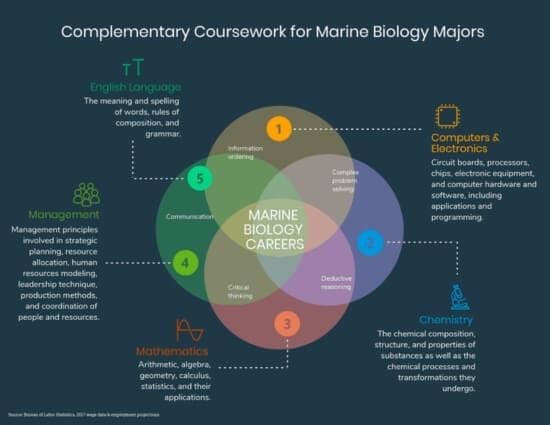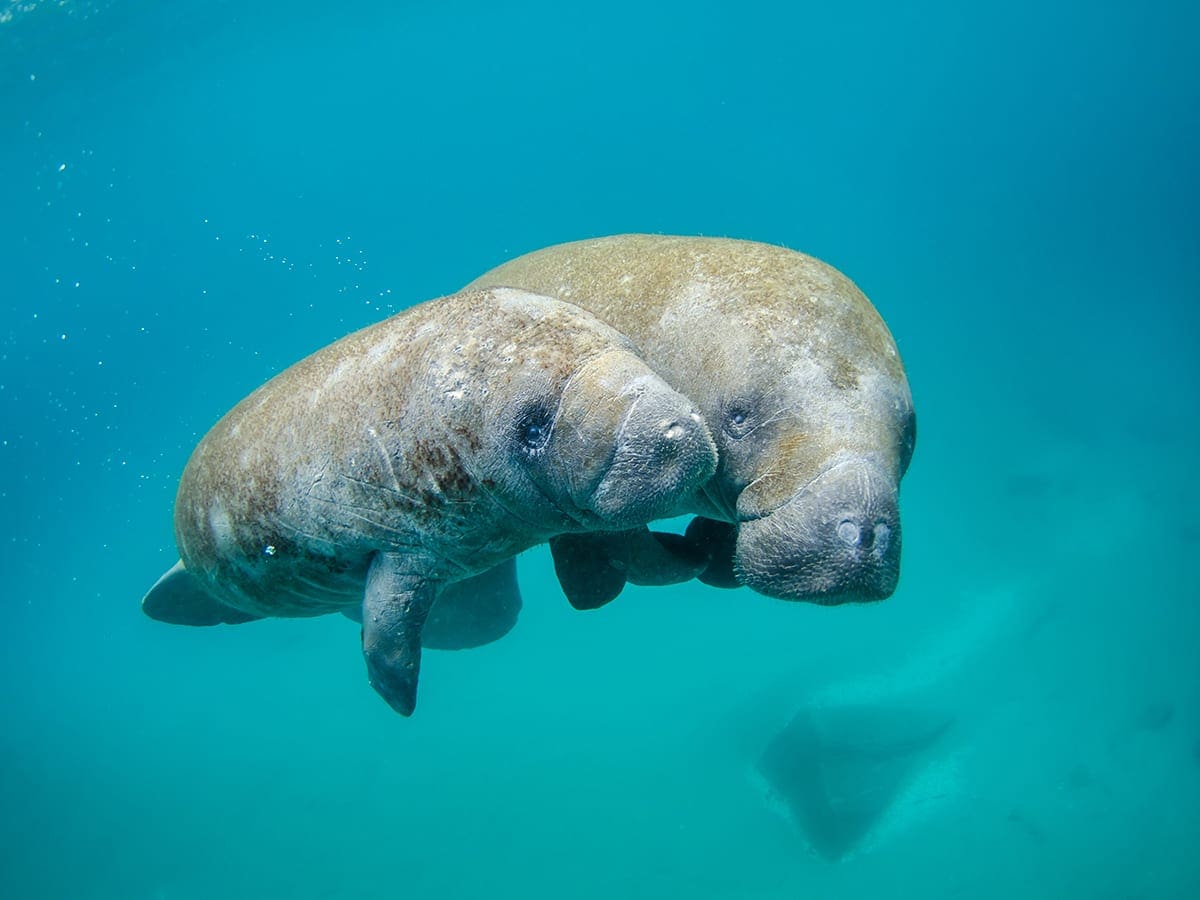Spending four years of your life—or more—studying a specific subject is a big commitment that requires a serious, informed decision. What you choose to major in should be something that excites you; it should be something you’ve daydreamed about; maybe even something you’ve pictured yourself doing for a living.
When it comes to marine biology, that’s easy to do. If you’re like a lot of prospective students considering a marine biology degree, you’ve pictured yourself cruising along the sun-swept beaches of southern California chirping with dolphins or helping rare whale species divert danger. Or, maybe you see yourself standing at the bow of a glittering research vessel clad in scientific superhero garb with the words “marine biologist” emblazoned across your chest as your team busily documents your latest breakthrough.
The fact is, the job title “marine biologist” is pretty rare. People who work with aquatic plants and animal species—i.e., marine professionals—work in a variety of settings and environments and can hold a host of different positions throughout their careers.

Ready To Learn More About Unity Environmental University?
So, what can you do with a marine biology degree?
We get it. It can be confusing trying to understand all the options out there, but don’t worry. We dug into research from the U.S. Department of Labor (USDOL) and the National Oceanic and Atmospheric Administration (NOAA) to help you navigate the path that makes the most sense for your future. To that end, we profiled a broad selection of job titles, daily tasks, necessary skills, and job outlook for those who choose to enter a marine biology program.
Table of Contents
- Marine Biology Careers for ‘Scientists’
- Job Titles You Can Expect
- Day-to-Day Tasks You’ll Perform
- Knowledge You’ll Need to Acquire
- Job Outlook
- Bottom Line
Marine Biology Careers for ‘Scientists’
Jobs that fall into this category require people who are highly analytical, research-oriented, and driven by data, measurement, and statistical significance. Researchers will have the opportunity to specialize in a specific field and work in myriad settings throughout their careers. These occupations often involve coordinating, training, supervising, or managing the activities of others to accomplish goals. Almost all research-oriented marine biology careers will require some level of additional certification and, most likely, a graduate degree.
Marine biology job titles you can expect to see
People in these roles research or study basic principles of plant and animal life, such as origin, relationship, development, anatomy, and functions, according to the USDOL. It also says these marine professionals require “very advanced” communication and organizational skills.
Jobs in this category include (but aren’t limited to):
- Aquatic scientist
- Research biologist
- Biological scientist
- Biologist
- Botanist
- Horticulturist
- Microbiologist
- Biological technician
Other jobs that might resonate with research-loving marine biology majors include mathematician, geneticist, or biology professor, but the education required, median salary, and job outlook varied too much to be included here.
Knowledge you’ll need to acquire with a marine biology degree
Because marine biology degree-holders have wide and varied career options, it’s crucial to prepare yourself with a diverse foundation of coursework. Obviously, you’ll need to take classes in biology, but other schools of study can provide a knowledge base that will complement the work you’re already doing and set you up for future success in a competitive field.

In addition to coursework, marine biologist and coral reef researcher, Khatija Alliji, encourages students to take advantage of extracurricular opportunities.
“I would recommend volunteering as much as possible throughout your education as you gain invaluable skills, which increase your career prospects,” Alliji told Wondr in 2017. “[Volunteering] also allows you to network and start to gain experience within the industry helping you to direct your career.”
Day-to-day tasks you’ll be asked to perform
People in research-oriented marine biology careers study the basic principles of plant and animal life, such as origin, relationship, development, anatomy, and function. The specific tasks you’ll do on a daily basis will correspond to the field in which you find yourself but, according to the USDOL, here are some common tasks you can anticipate in the analytical kind of career you’re seeking.
- Collect and analyze biological data about relationships among and between organisms and their environment
- Supervise biological technicians and technologists and other scientists
- Program and use computers to store, process, and analyze data
- Study aquatic plants and animals and environmental conditions affecting them, including radioactivity or pollution
- Prepare technical and research reports, such as environmental impact reports, and communicate the results to individuals in industry, government, or the general public
Job Outlook for Marine Biology Careers
Marine biologists are listed in the Bureau of Labor Statistics with zoologists and wildlife biologists. In 2020, 63 percent of people in these jobs worked for government or federal organizations; 9 percent of people worked in “Management, scientific, and technical consulting” services; and, 6 percent worked as educators at a college or university.
Similar to jobs in the animal-loving career path, the job market for research-oriented marine biology careers is very competitive. The number of these jobs available is growing at a slower than average rate of 5% percent through 2030. The good news is that the BLS projects 1,000 new jobs in research-oriented marine biology fields through 2030.
The median annual salary for these careers in 2020 was $66,350. Earners in the top 10 percent earned more than $106,320 in the year. But it’s important to note, that is a nationwide median that includes workers at all levels of education and experience. Salary can vary significantly based on geography and employer and shouldn’t be considered a starting salary. Higher salaries typically require a higher degree of education and experience.
The bottom line
There is no single article on the internet that will be able to explain definitively what you can do with a marine biology degree. It’s a field in which career options are vast and varied and depend largely on your academic pursuits and your personal passions.
According to the NOAA website: “A marine biologist might be a biological technician, ichthyologist, fishery biologist, marine mammalogist, microbiologist, systems analyst, or a mathematician. Even economists and sociologists, who deal with living marine resource issues, are found within the so-called field of marine biology.”
We know one thing, however. The field is very competitive and the number of marine scientists exceeds and is expected to continue outpacing, the number of jobs available. That’s why it’s important to differentiate yourself through academic work and take advantage of the myriad skill-building opportunities available to you through your institution. Still not sure? Explore more ocean jobs and discover other rewarding career paths in the marine world.
Explore Marine Biology Degrees:
If you’re considering Unity Environmental University for your marine biology degree, here are more reasons to dig deeper.
*Source: U.S. Bureau of Labor Statistics 2017 wage data and 2016-2026 employment projections.
Photo credit: The Octopus Foundation




